AI tools are revolutionizing how mental health professionals handle their clinical documentation and progress notes. These advanced systems can reduce note-taking from hours to minutes while maintaining clinical accuracy.
You can now access specialized features like HIPAA compliant recording, mental health-specific templates, and seamless EHR integration. Machine learning technology enables these AI systems to understand therapy context and create comprehensive documentation.
This guide will help you navigate the best AI tools for mental health professionals available in 2024. You’ll discover how to choose the perfect solution for your specific needs and practice requirements.
What to Look for in AI Tools for Mental Health Professionals
Finding the right AI documentation software requires focusing on features that actually matter for therapy practice. Not all AI systems are created equal for mental health support and behavioral health documentation.
Essential Features for Therapy Practices
- HIPAA compliance and data security - Non-negotiable for any tools handling client session data
- Mental health-specific templates - Look for SOAP, DAP, and treatment plans formats designed for therapy sessions
- EHR integration capabilities - Native integration saves time compared to copy-paste workflows
- Clinical language accuracy - The AI should understand therapeutic terminology and session dynamics
- Customization options - Different therapy modalities require different documentation approaches
Practical Considerations
Beyond core features, daily usability determines whether you’ll actually use AI powered features consistently.
- Ease of setup and daily use - Complex systems often get abandoned despite good intentions
- Pricing structure - Consider whether per-note or unlimited pricing works better for your caseload
- Customer support quality - Technical issues during busy practice days need quick resolution
- Learning curve - Factor in time investment for AI training yourself and staff
The best AI tools for mental health professionals balance sophisticated clinical capabilities with practical ease of use. Tools built specifically for behavioral health typically outperform general medical documentation platforms for therapy-specific needs.
Top AI Documentation Tools for Mental Health Professionals
Here’s a detailed breakdown of the leading artificial intelligence documentation tools specifically designed or adapted for mental health professionals.
Supanote - Built Specifically for Mental Health
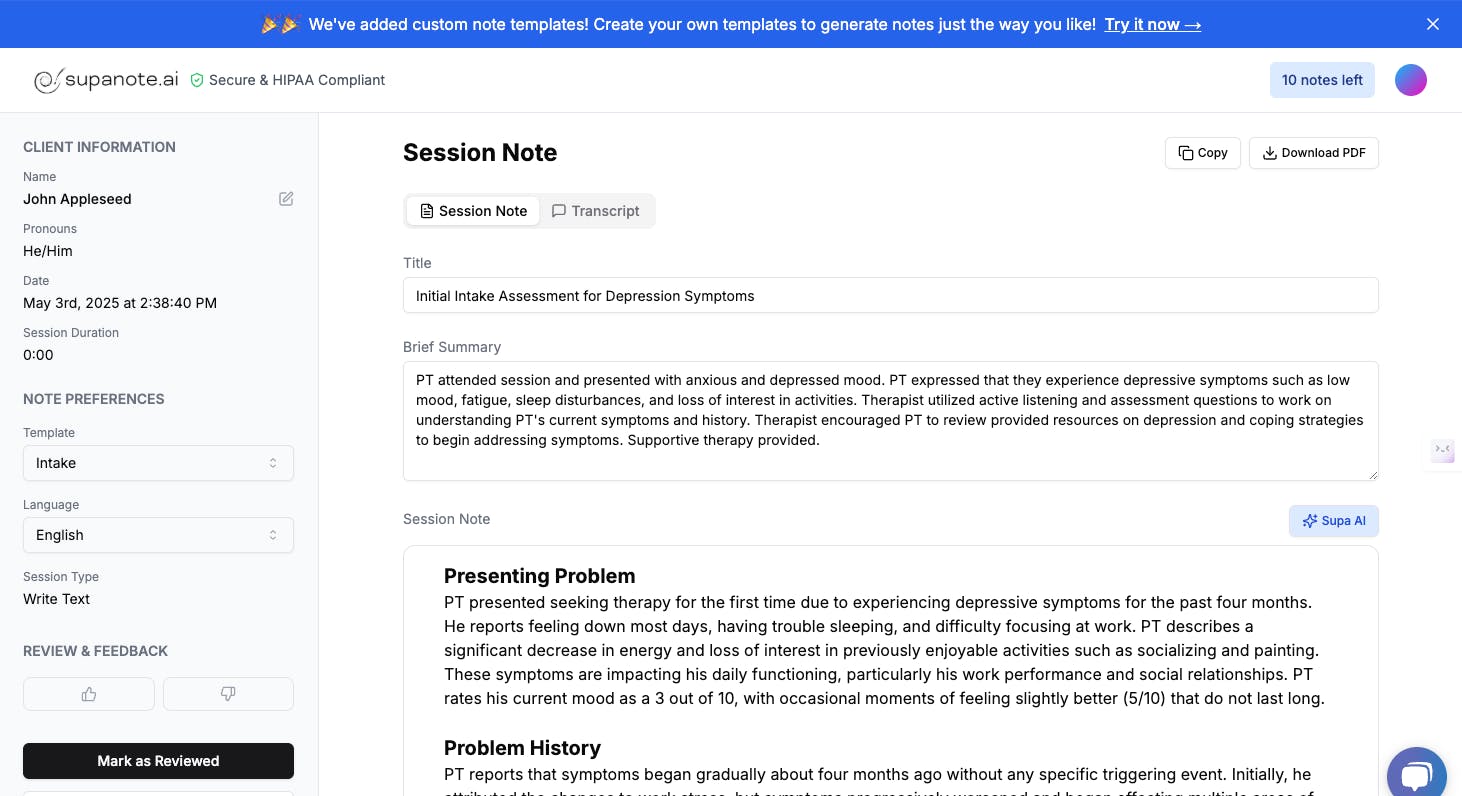
Supanote stands out as one of the few AI systems designed exclusively for mental health professionals. The platform focuses on native EHR integration and deep personalization for therapy practices.
- Native EHR autofill with ‘Super Fill’ button that transfers therapy notes directly to your existing systems
- Deep personalization technology that learns your documentation style over time
- Mental health-focused templates using clinical language specific to therapy sessions
- Simple, user friendly interface backed by superior human support
- Comprehensive HIPAA compliance with mental health-specific data security measures
- Templates for various therapy modalities including CBT, DBT, and trauma-informed care
Pricing: Basic plan at $29.99/month (40 notes), Professional at $49.99/month (100 notes), Premium at $89.99/month (unlimited notes). 14-day free trial with 20% annual discount.
Best suited for: Solo practitioners and group practices seeking seamless EHR integration with mental health specialization.

Mentalyc - Established Mental Health Focus
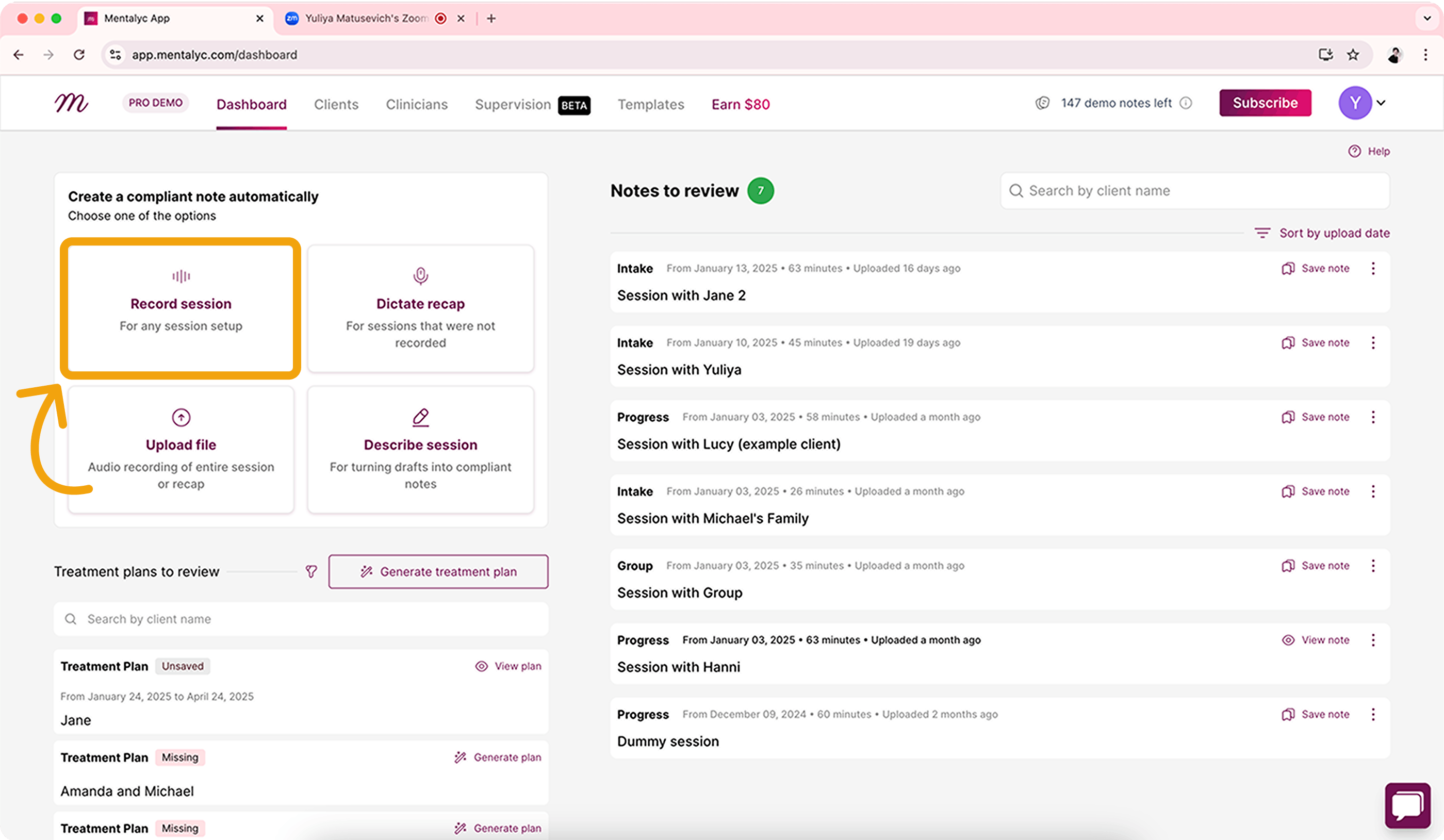
Mentalyc has established itself as a reliable choice for mental health professionals, offering structured templates and team collaboration features.
- SOAP and DAP note templates specifically designed for therapy documentation
- Team collaboration features allowing supervisors to review and edit progress notes
- Copy-paste workflow that integrates smoothly with most EHR systems
- Mental health-specific AI models trained on therapy terminology
- Progress tracking and treatment plans integration
- Secure client data handling with full HIPAA compliant measures
Pricing: Mini plan at $19.99/month (40 notes), Professional at $39.99/month (100 notes), Premium at $69.99/month (unlimited notes). 7-day free trial with 16.7% annual discount.
Best suited for: Group practices and clinics requiring team collaboration features with structured note formats.
Upheal - Notes Plus Telehealth Platform
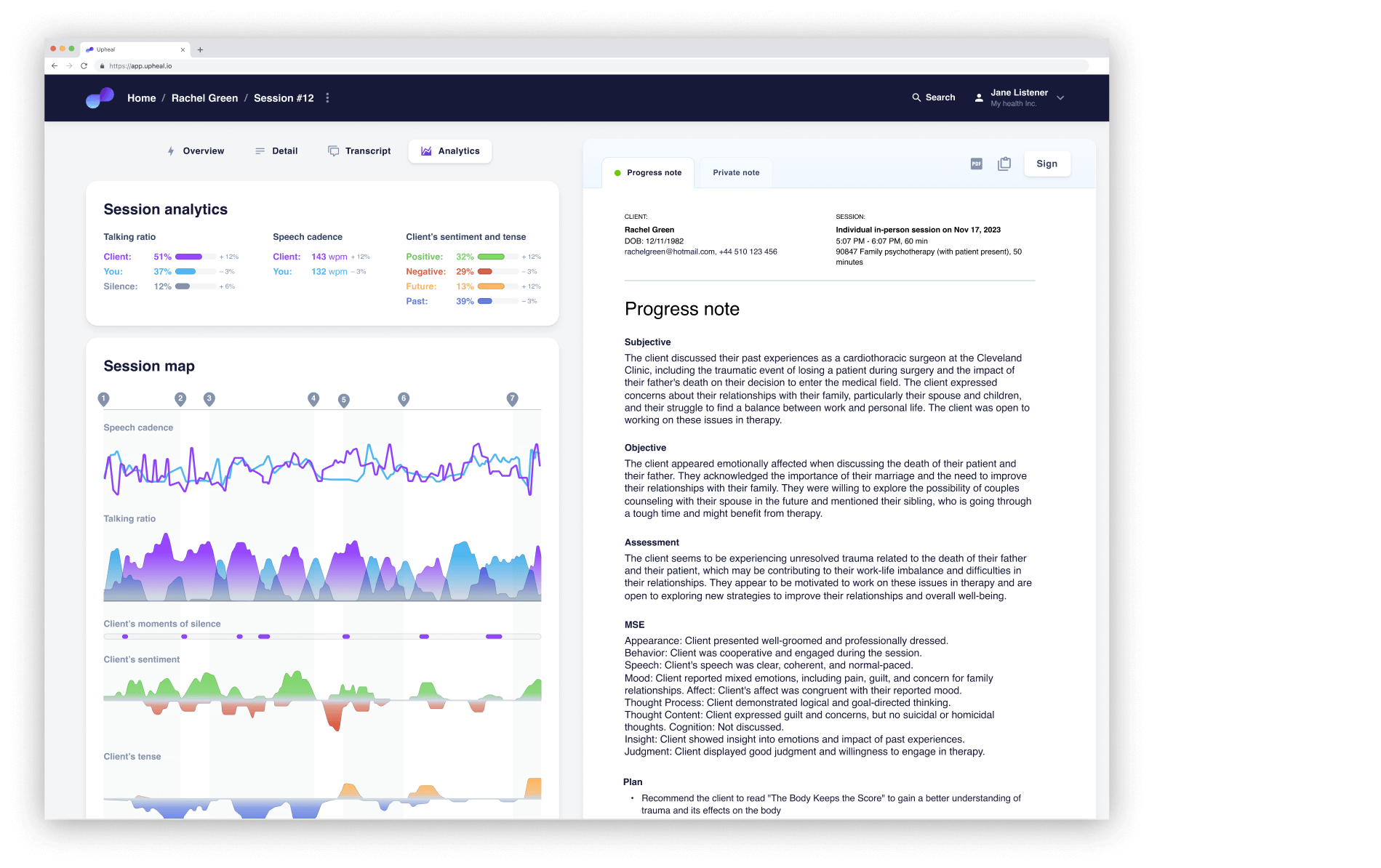
Upheal offers a comprehensive solution combining AI documentation with telehealth capabilities, making it attractive for practices transitioning to or maintaining virtual sessions.
- Unlimited basic notes available in permanent free tier
- Built-in telehealth platform with session recording and analysis
- Recent funding rounds enabling rapid feature development and platform improvements
- AI-powered session insights and client progress tracking
- Secure video conferencing with automatic note generation
- Multi-language support for diverse client populations
Pricing: Free tier (unlimited basic notes), Plus at $19/month, Premium at $35/month, Pro at $69/month. 14-day Premium free trial with 20% annual discount.
Best suited for: Therapists conducting telehealth sessions who want an all-in-one platform for documentation and client sessions.
Blueprint - Session-Based Pricing
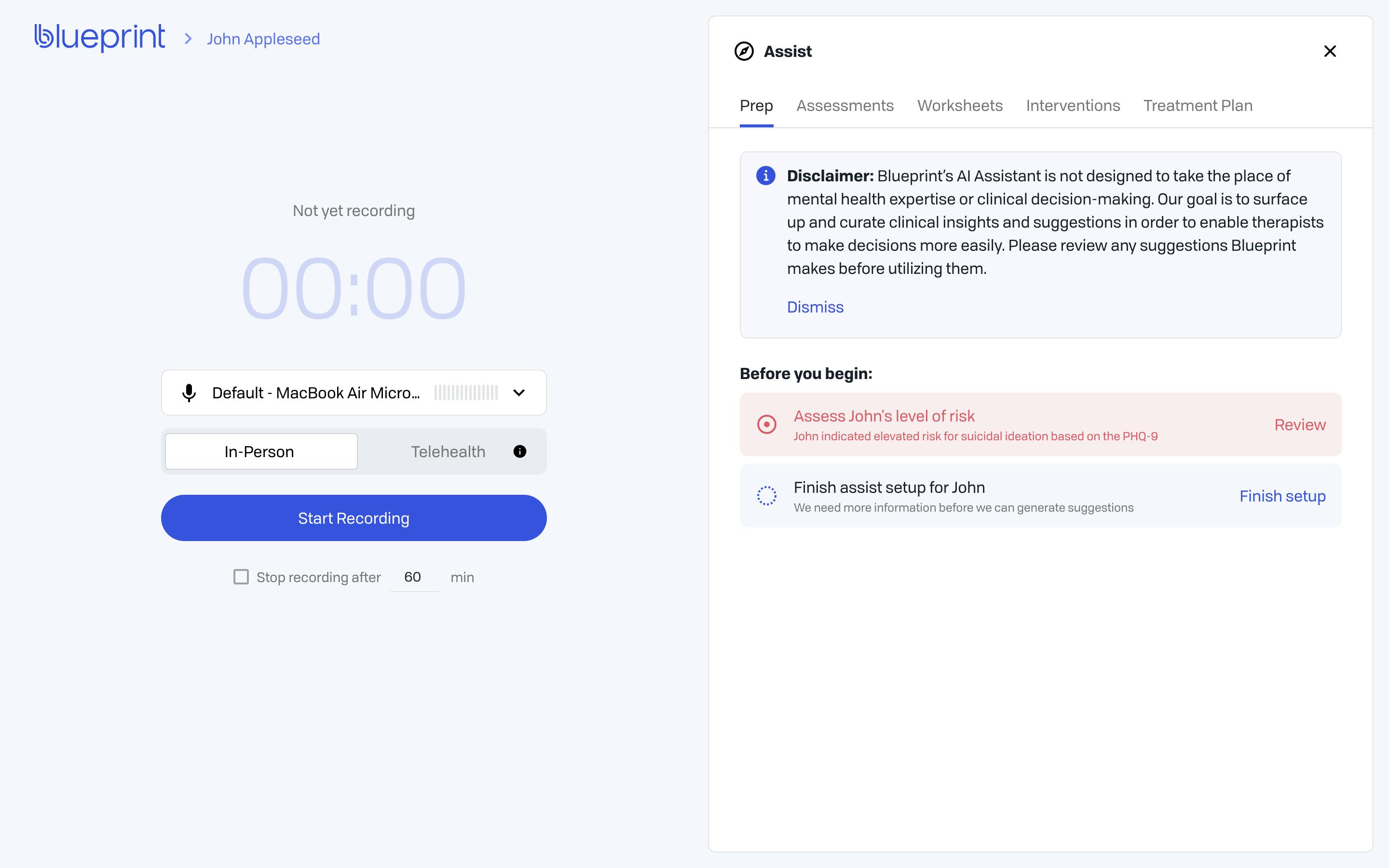
Blueprint offers a unique session-based pricing model with automatic upgrade features, designed for flexibility in busy therapy practices.
- Auto-upgrade systems that adjust your plan based on actual usage
- Blueprint 2.0 features including enhanced AI accuracy and faster process
- Session-based billing model that charges based on completed documentation
- Integration with major EHR systems used in mental health practices
- Customizable note templates for different therapeutic approaches
- Real-time collaboration tools for supervision and training
Pricing: Starting at $29/month with higher tiers available based on session volume. Currently offering 50% off first 3 months promotion.
Best suited for: Practices with variable session volumes who prefer flexible, usage-based pricing systems.
Quill Therapy Notes - Summary-Based Approach
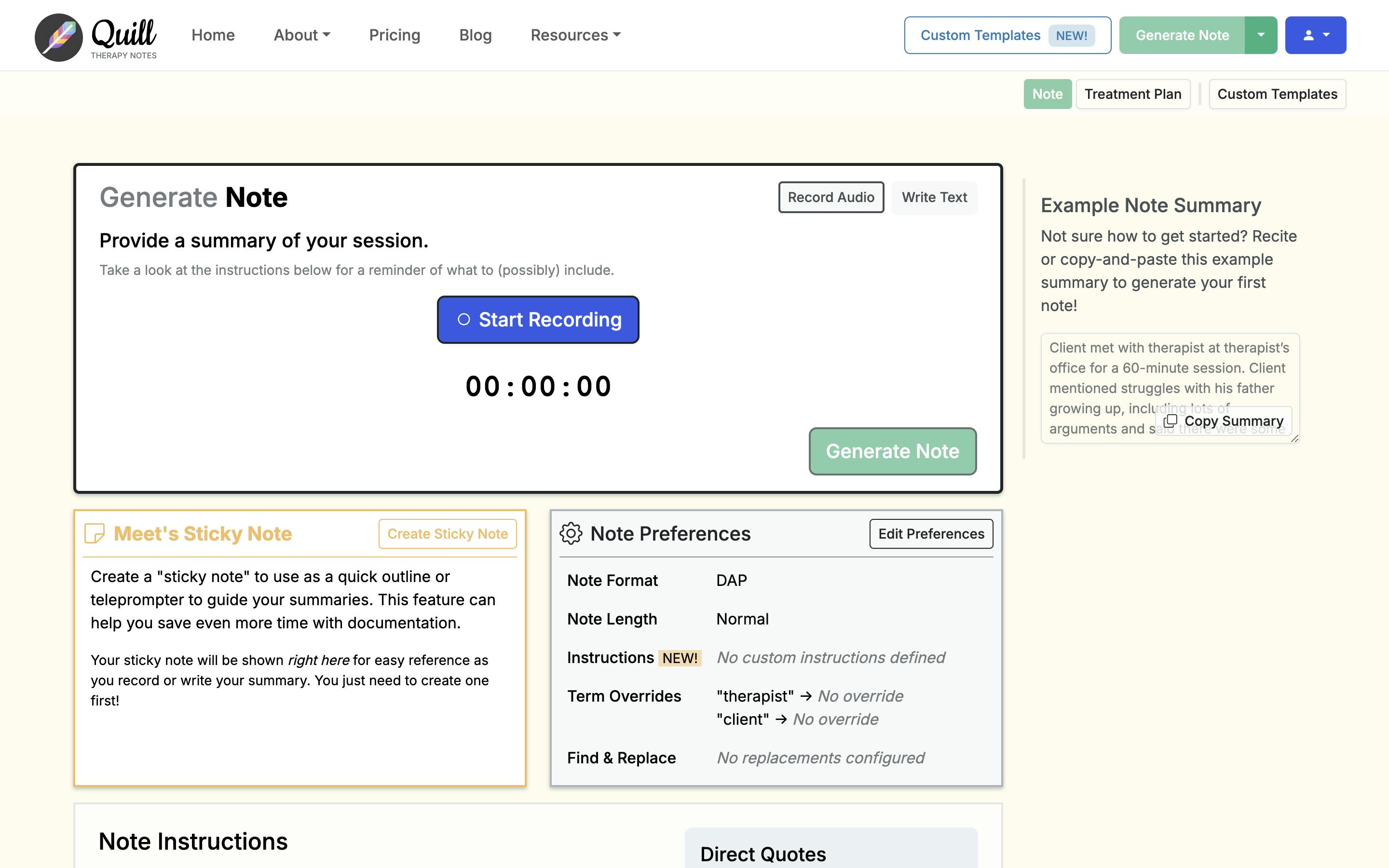
Quill takes a different approach by generating notes from session summaries rather than recordings, appealing to therapists who prefer manual input methods.
- No session recording required - works with therapist-written session summaries
- Summary-based note generation that expands brief notes into comprehensive documentation
- Mental health-specific templates covering various therapy modalities
- Privacy-focused approach with minimal data collection requirements
- Quick turnaround times for note generation and editing
- Integration options with popular EHR systems
Pricing: Individual plan at $20/month for unlimited notes, Team plan at $16/month per user.
Freed.ai - General Medical with Mental Health Support
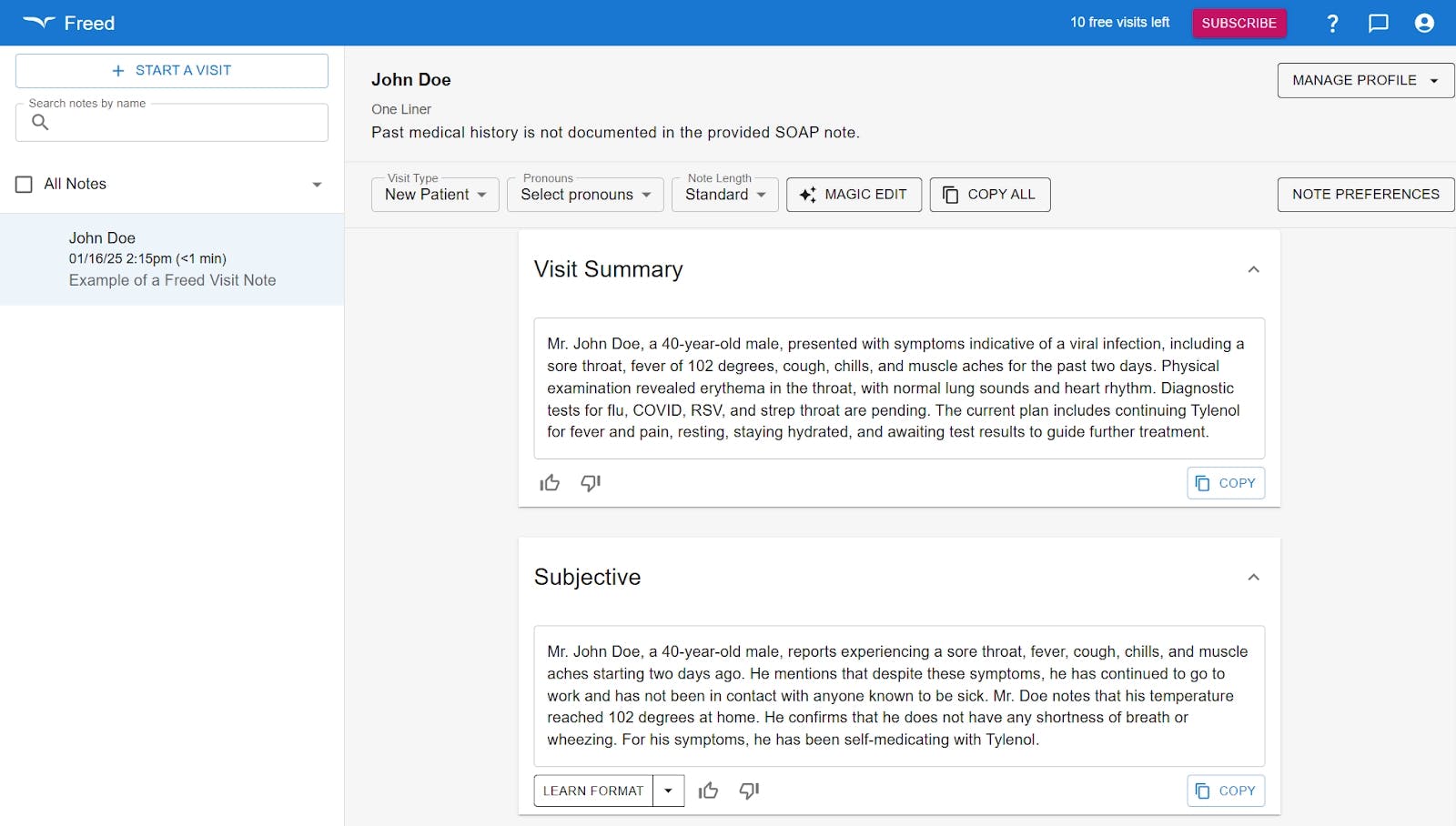
Freed.ai serves all medical specialties but includes robust mental health support, making it suitable for integrated healthcare settings.
- Unlimited progress notes at single pricing tier with no usage restrictions
- All medical specialties supported including psychiatry and psychology
- Strong effectiveness ratings across different types of clinical documentation
- Integration with major EHR systems used in healthcare settings
- Multi-specialty vocabulary including mental health terminology
- Group pricing available for larger organizations and healthcare systems
Pricing: $99/month for unlimited notes, Group pricing at $84/month for 2-9 users. 10 visits free trial.
Best suited for: Multi-specialty organizations, integrated healthcare systems, or therapists working in medical settings who need broader clinical documentation support.
Yung Sidekick - Session-Based Mental Health Tool
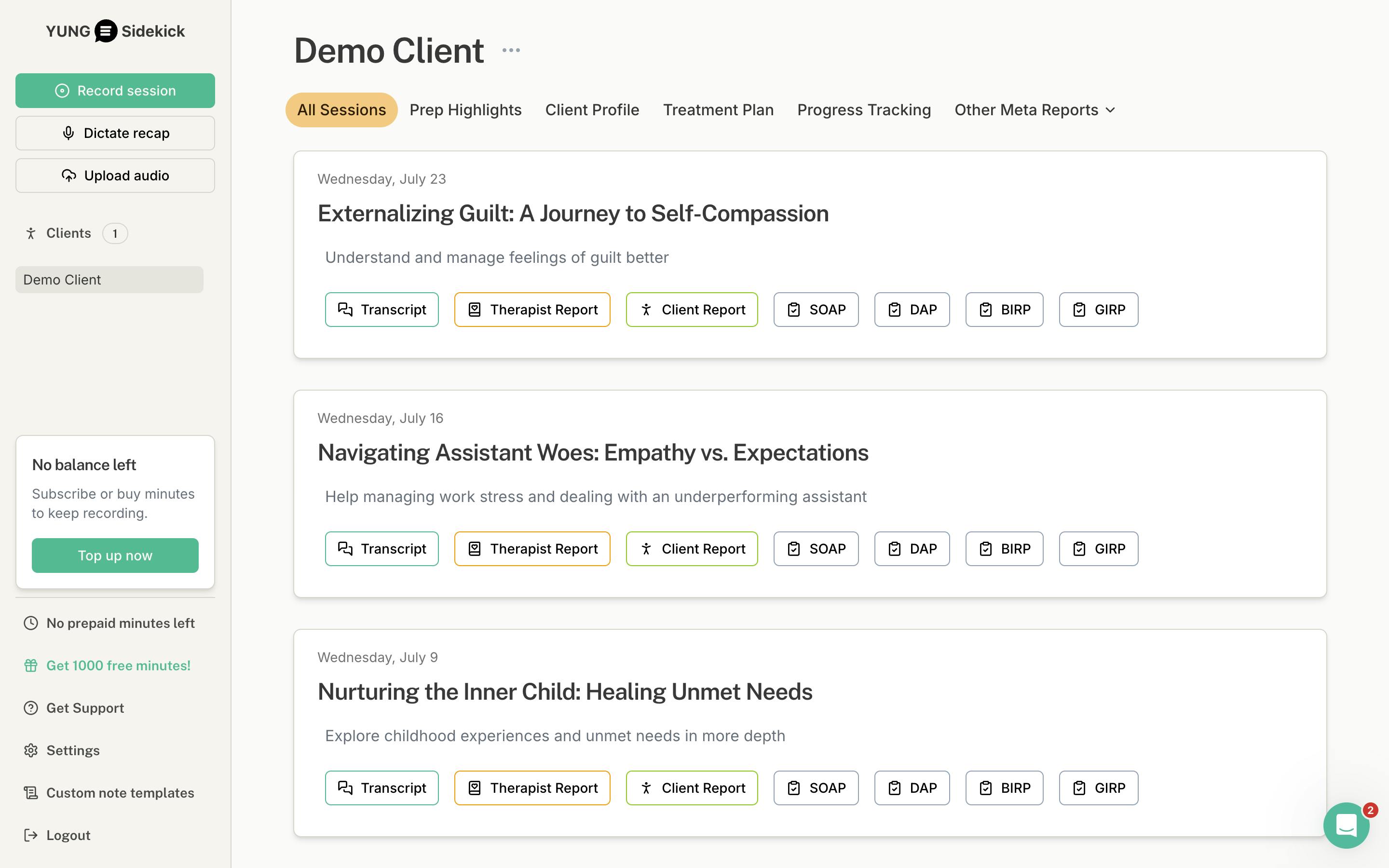
Yung Sidekick focuses specifically on mental health with a session-based pricing model and detailed usage tracking.
- Session-based pricing model with clear per-minute overage charges
- Mental health specialization with therapy-specific language models
- Detailed usage analytics showing documentation patterns and effectiveness gains
- HIPAA compliant recording and transcription service
- Integration with popular therapy-focused EHR systems
- Overage charges at competitive $0.03/minute rate for usage transparency
Pricing: Starter at $39.99/month (130 sessions), Professional at $59.99/month (250 sessions), Premium at $99.99/month (400 sessions). 7-day free trial with 10% annual discount.
Best suited for: High-volume organizations that want predictable session-based pricing with mental health specialization and detailed usage tracking.
AI Tools Comparison for Mental Health Professionals
Here’s a comprehensive comparison of the top AI documentation tools specifically evaluated for mental health practices:
Tool | Starting Price | Best Suited For |
|---|---|---|
Supanote | $29.99/month (Free plan available) | Mental health practices needing native EHR autofill and deep personalization |
Mentalyc | $19.99/month | Established practices wanting SOAP/DAP templates with team collaboration |
Upheal | Free (unlimited basic notes) | Therapists needing both telehealth platform and AI documentation in one solution |
Blueprint | $29/month | Solo practitioners preferring session-based pricing with auto-upgrade features |
Quill Therapy Notes | $20/month | Therapists who prefer summary-based notes without session recording |
Freed.ai | $99/month | Multi-specialty practices or therapists wanting unlimited notes across all medical fields |
Yung Sidekick | $39.99/month | Mental health professionals with predictable session volumes and overage flexibility |
When evaluating these options, consider your specific EHR system, documentation volume, and whether you need mental health-specific features or general medical capabilities.
Choosing the Right Tool for Your Practice
The best AI tools for mental health professionals vary significantly based on your practice size and specific needs.
For Solo Practitioners
- Supanote starts at $29.99/month with strong mental health focus and excellent support
- Upheal offers unlimited basic progress notes completely free, making it ideal for budget-conscious therapists
- Quill Therapy Notes at $20/month provides unlimited therapy notes without requiring session recordings
- All these AI systems offer transparent pricing and generous free trials to test compatibility
For Group Practices
- Mentalyc provides team collaboration features with volume discounts for multiple users
- Freed.ai offers group pricing at $84/month for 2-9 health professionals with unlimited note access
- Supanote includes native EHR integration with their ‘Super Fill’ button, reducing administrative tasks
- Look for AI platforms offering administrative dashboards and usage reporting
Key Decision Factors
Evaluate your current EHR system’s compatibility first. If you use SimplePractice or TherapyNotes, prioritize AI tools with direct integration.
Consider whether you prefer per-note pricing or unlimited plans based on your session volume. Finally, match the tool’s specialization to your therapy modalities—CBT, DBT, or trauma-focused organizations may benefit from specialized templates.
Frequently Asked Questions
Q: Are AI documentation tools HIPAA compliant for therapy sessions?
Yes, reputable AI tools for mental health professionals are built with HIPAA compliance as a core feature. These AI systems use encrypted data transmission and secure cloud storage with robust data security protocols. Always verify data privacy compliance before choosing any tool for your practice to ensure client safety.
Q: How accurate are AI-generated therapy notes compared to manual documentation?
AI tools typically achieve 85-95% effectiveness for clinical content when AI models are properly trained on mental health language. You’ll still need to review and edit progress notes for clinical accuracy. Most therapists find AI-powered features require minimal corrections after an initial training period with these AI systems.
Q: Can AI tools integrate directly with my existing EHR system?
Integration capabilities vary significantly between AI tools and software platforms. Some offer native EHR autofill features, while others require copy-paste workflows for therapy notes. Check your specific EHR’s compatibility before committing to any AI documentation platform to manage your administrative tasks effectively.
Q: What’s the typical learning curve for implementing AI documentation tools?
Most therapists become proficient within 1-2 weeks of regular use with proper AI training. The initial setup takes 15-30 minutes, and most AI models learn your documentation style after 5-10 sessions. Quality human support can significantly reduce the learning curve and enhance user effectiveness.
Q: How do session-based vs. unlimited pricing models compare for different practice sizes?
Unlimited plans ($20-99/month) work best for high-volume practices or full-time therapists managing extensive progress notes. Session-based pricing suits part-time practitioners or those with variable caseloads. Calculate your monthly session data volume to determine which model offers better cost value for your specific needs.
Q: Do AI tools work effectively with different therapy modalities like CBT, DBT, or EMDR?
Many AI tools can be customized for specific therapy modalities through templates and training protocols. Look for platforms that offer modality-specific templates or allow customization for behavioral health approaches. Some AI systems learn your preferred language and interventions over time, providing data-driven insights into your therapeutic process.
Q: What happens to my data if I switch AI documentation tools?
Most platforms allow data export, but formats vary between providers and software companies. Always clarify data portability and retention policies before starting to ensure access to your session data. Some tools offer migration assistance when switching from competitors, which industry experts recommend for seamless transitions.
Q: Can AI tools help with treatment plans beyond just session notes?
Several AI platforms offer treatment planning templates and goal-setting features for comprehensive behavioral health support. These tools can generate treatment plan language based on session content and clinical assessments. However, human clinical decision making remains essential for treatment planning decisions and progress tracking.
Q: How do free trials typically work for AI documentation tools?
Most tools offer 7-14 day free trials or a limited number of free sessions for users to test effectiveness. Some provide free tiers with basic features and user-friendly interfaces. Use trials to test the tool with real sessions to evaluate accuracy and workflow compatibility with your personal practice style.
Conclusion
The best AI tools for mental health professionals can transform your practice efficiency and clinical workflow through artificial intelligence technology. Each platform offers unique strengths, from native EHR integration to specialized mental health support features designed for therapy professionals.
Take advantage of free trials to test multiple AI tools with your actual sessions and gather client feedback. Consider your specific needs - whether it’s pricing structure, EHR compatibility, or specialized therapy templates - to make the best choice for your practice and create better outcomes.
The future of mental health documentation lies in AI-powered features that reduce administrative tasks while maintaining clinical excellence. These tools help therapists focus on what matters most: providing quality therapy and wellness support to clients through in-person and virtual sessions.
Implementing the right artificial intelligence solution will enhance your practice’s effectiveness while ensuring compliance and data privacy. Machine learning capabilities continue to improve, making natural language processing more accurate for behavioral health documentation and clinical insights.


